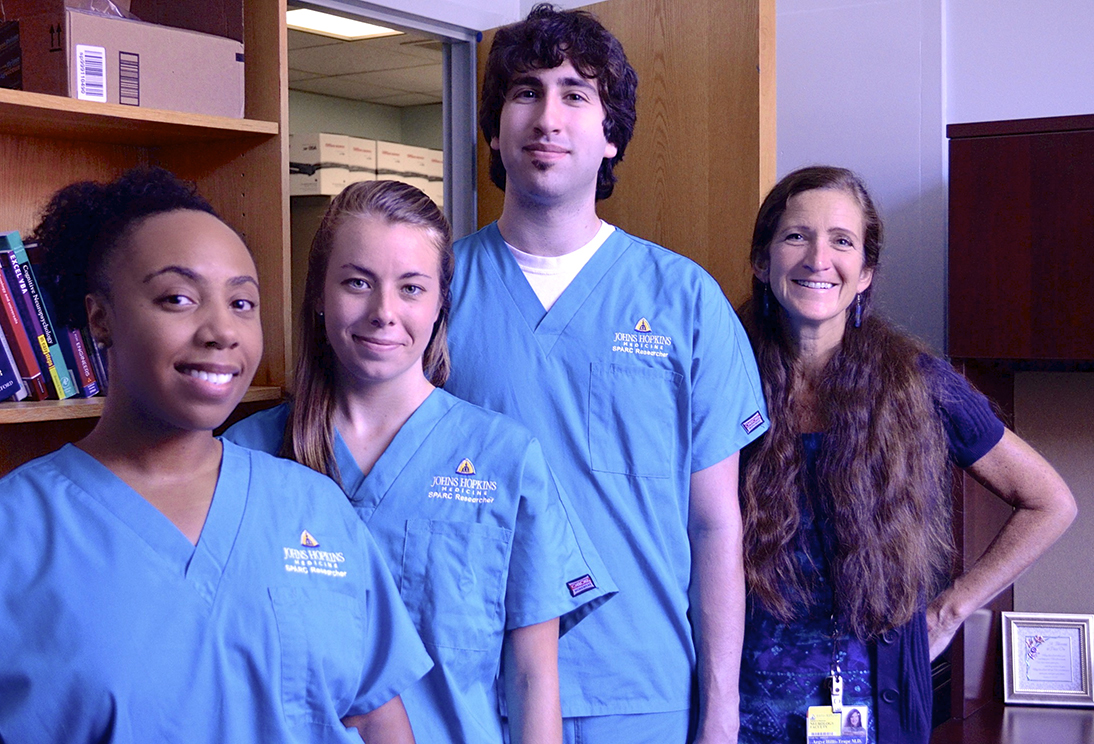
According to the American Heart Association’s 2014 heart disease and stroke statistics, stroke is responsible for one out of every 19 deaths in the United States.1 Although stroke is a leading cause of serious long-term disability, Amy Wright ’15 has learned “that strokes can be preventable and manageable, to an extent.”
Wright, a neuroscience major, is currently interning as a research assistant at the Johns Hopkins Hospital Stroke Prevention and Recovery Center in Baltimore.
She is working in the lab of stroke expert Dr. Argye Hillis-Troupe, helping to conduct research and carry out clinical explorations. Dr. Eric Aldrich ’82, father of Wright’s classmate Zoe Aldrich ’15, is a neurologist in the Hopkins system responsible for connecting Wright and Hillis-Troupe. Wright appreciates this contact, as well as the support she has received for her internship from the Jeffrey Fund in the Sciences.
Strokes continue to confound doctor despite the fact that prognoses continue to get better as research and technology develops. Wright emphasized that “every brain is different, so every stroke is different. Two patients with identical strokes could have startlingly different symptoms, simply because they are ‘wired’ differently.” The brain is an “impossibly complex system,” Wright acknowledged, and although “neurologists have made enormous progress in understanding the physiology of the brain, [...] there are still very few treatments available for many of the problems that result from consequent damage.”
This summer, Wright is primarily looking at patient’s ability to process and communicate language, focusing on understanding the physiological cause of aprosody, the inability to comprehend or convey emotion in speech, after suffering a stroke. “This involves analyzing voice recordings to determine range of frequency, as well as MRI scans to see what parts of the brain have been affected by the stroke,” she explained. In her time at the Center, she has learned technical skills, such as MRI and fMRI scanning and analysis, and has come to understand “the importance of the soft skills necessary to do this type of work.”
“It is critical to be able to be flexible and creative when communicating with these patients,” Wright explained, “as well as empathetic and often sympathetic as well. These are skills you can only get through actually working with patients hands-on, which is what makes this experience so valuable.” For the aprosodic patients in particular, Wright said that “subtle [verbal] undertones are a crucial part of our interactions as humans, and an inability to interpret and produce them can create significant interpersonal rifts and terrible misunderstandings.”
Strokes can be incredibly debilitating, both physically as well as mentally and emotionally. “Some experts have begun referring to stokes as ‘brain attacks,’” Wright explained, “in an attempt to get people to respond them with as much urgency as they would a heart attack. Many stroke symptoms are reversible or potentially amenable,” she continued, “but such progress can only be made if action is taken immediately after the onset of symptoms.” Stroke patients are not the only ones affected by these attacks, however; “Most likely a change in lifestyle for the victim also means a change in lifestyle for those around them, and that can be very challenging,” Wright said.
She has learned that “The first step is to know your history and understand the risks. If you are genetically predisposed to dementia, Alzheimer’s disease, or any neurological disorder, you may also be at higher risk of suffering a stroke,” she noted.
Wright plans on going into the medical field after graduation, but has not committed to neuroscience as a career. She is uncertain of precisely how she wants to get involved: “I had never thought much about going into research,” she confessed, “but I have been really inspired by the work I’ve done here and the things I’ve learned and seen.”
1Go AS, Mozaffarian D, Roger VL, Benjamin EJ, Berry JD, Blaha MJ, et al. Heart disease and stroke statistics—2014 update: a report from the American Heart Association. Circulation. 2014 ;128. Retrieved from http://www.cdc.gov/stroke/facts.htm.
Amy Wright is a graduate of the Williston Northampton School in Easthampton, Mass.
Posted August 5, 2014
